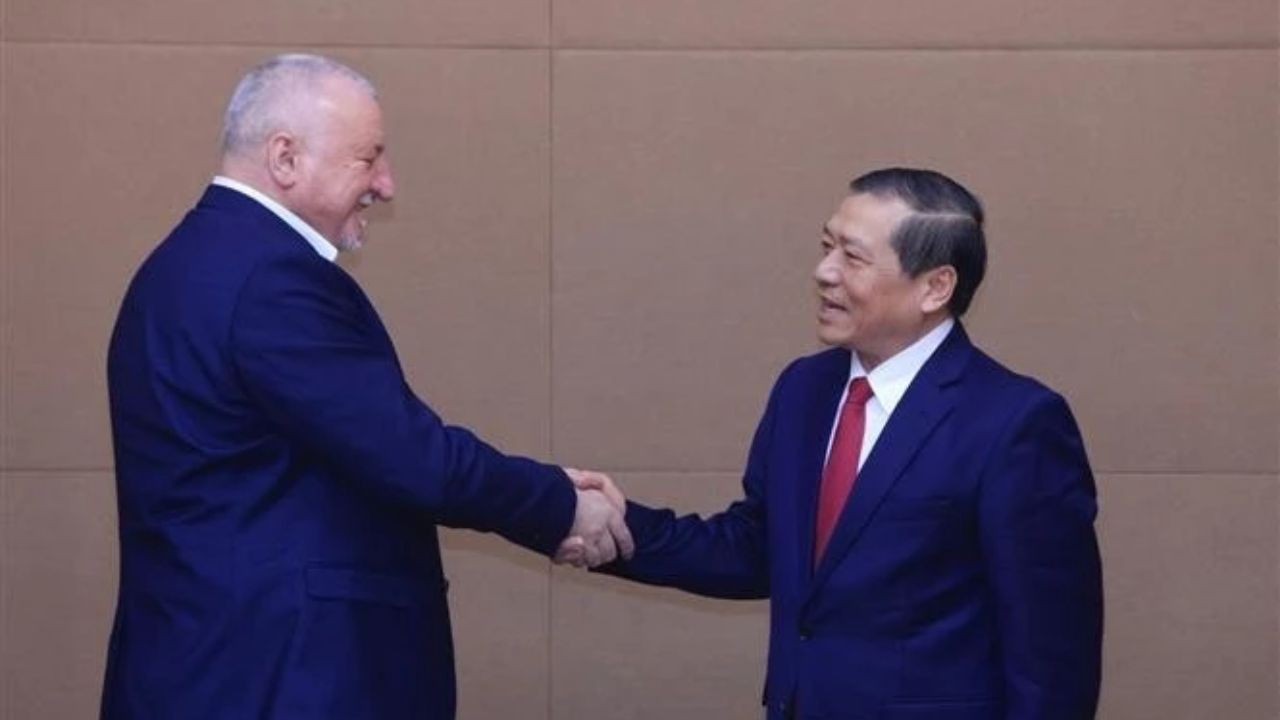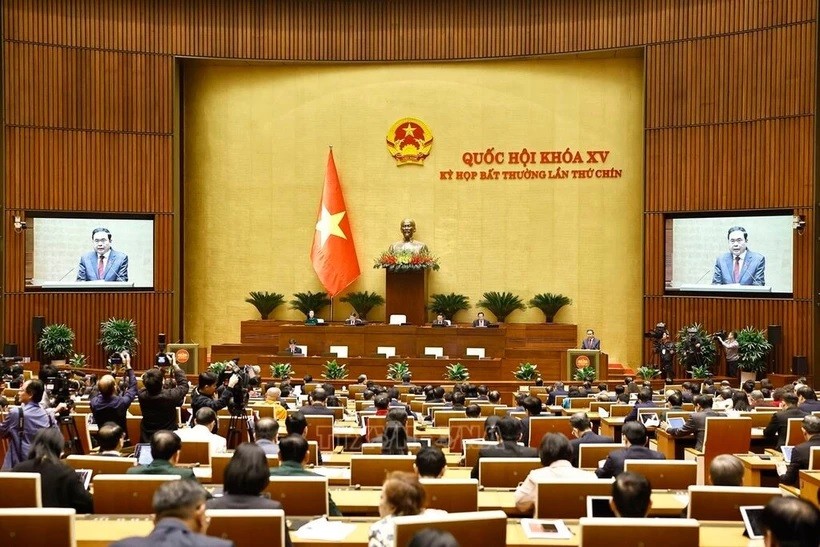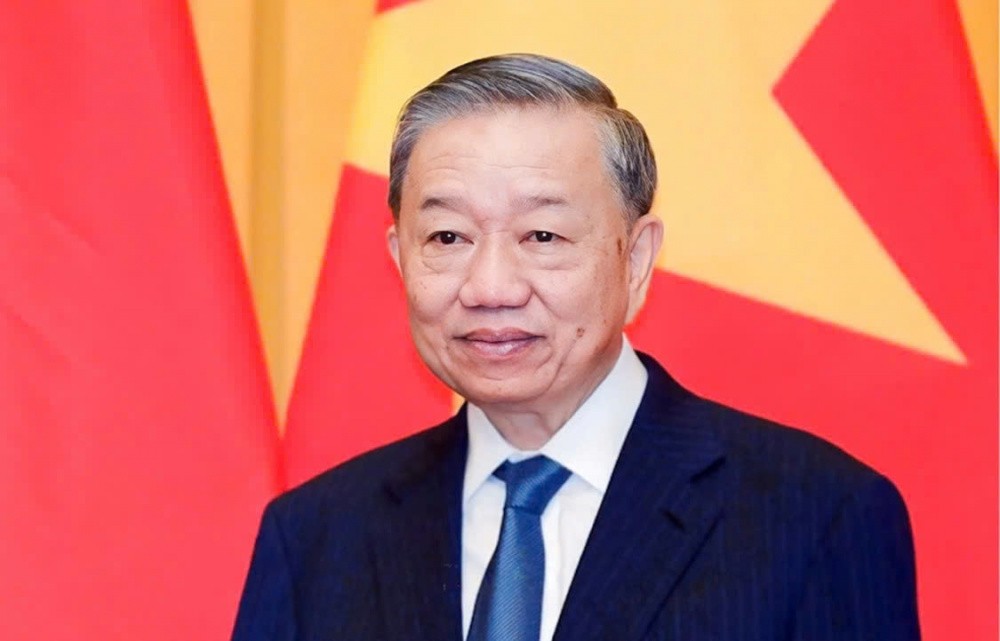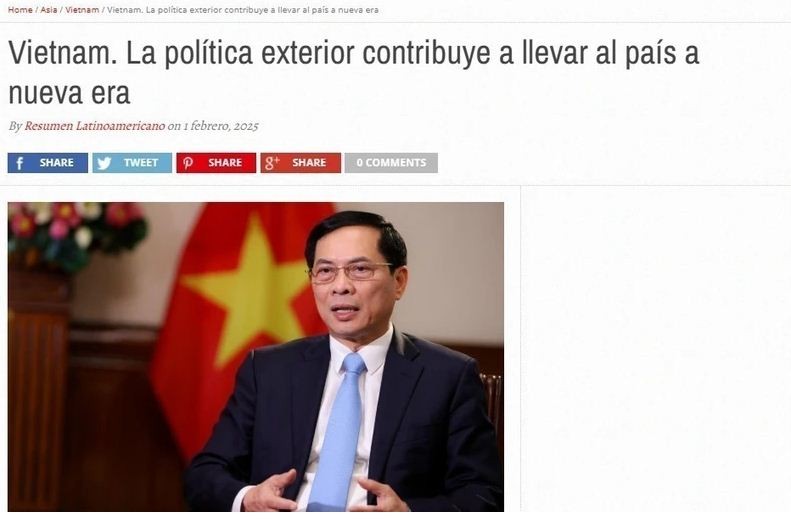Strengthening Party's Leadership to Safeguard National Security Amid International Integration (Part 1)
| Annual Tea Party Strengthens Bonds among Female Diplomats in Laos | |
| Vietnam, India Strengthen Cooperation through Party channels |
Economic security and ensuring national economic security in new context
Economic security is a broad concept, and each country defines it differently depending on its economic, political, and social conditions. Generally, economic security encompasses energy, finance, banking, telecommunications, food, water resources, and more, including both traditional and non-traditional aspects of security.
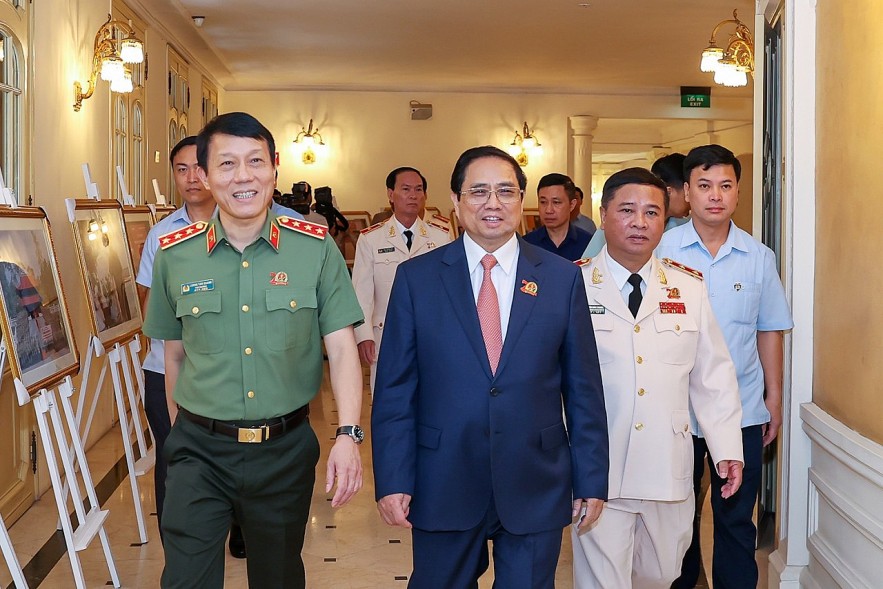 |
| Politburo Member and Prime Minister Phạm Minh Chính attended the ceremony celebrating the 70th Anniversary of the Economic Security Force's Traditional Day (May 13, 1953 - May 13, 2023) and the presentation of the First-Class Fatherland Protection Order, on May 13, 2023. (Photo: VNA) |
Economic security serves as the foundation and driving force for socio-economic development. At the same time, it is a crucial component of overall national security and a fundamental factor influencing a nation’s comprehensive strength. In the context of deepening globalization and international integration, the growing interdependence among countries has increased the pressure on ensuring economic security, presenting numerous challenges, risks, and threats.
In Vietnam, ensuring economic security holds a strategic position in the country’s efforts to build and develop the economy while safeguarding national security. This mission is closely tied to maintaining security across various domains, including internal politics, culture, ideology, information, science, and technology. Economic security serves as a cornerstone of national security, focusing on the implementation of policies for a socialist-oriented market economy, diversification and multilateralization of international economic relations, and integrating global engagement with the construction of an independent and self-reliant economy, led by the state sector.
This task also emphasizes the alignment of economic development with national defense, security, and diplomacy. It is recognized as a responsibility of the entire Party, people, government, and political system to preserve the stability and development of the socialist-oriented market economy against the impacts of both objective and subjective factors. Ensuring economic security is a prerequisite for creating a stable, secure, and favorable environment for the rapid and sustainable development of the economy. It supports macroeconomic stability, accelerates industrialization and modernization, and promotes the country’s international integration.
The Party's comprehensive leadership is viewed as a decisive factor in ensuring economic security and overall national security. This reflects the distinctive nature of Vietnam's socialist system.
Over the years, economic security has been a consistent priority for the Party and State of Vietnam. This commitment is evident in Party documents from the 6th National Congress onward, as well as in numerous directives from the Politburo and resolutions from the National Assembly and Government. Notably, Politburo Directive No. 12-CT/TW, issued on January 5, 2017, emphasizes strengthening the Party’s leadership in ensuring economic security in the context of a socialist-oriented market economy and international integration.
At the 13th National Congress, the Party reaffirmed that ensuring economic security is one of the 12 strategic orientations for national development in the 2021-2030 period. Furthermore, Politburo Directive No. 24-CT/TW, dated July 13, 2023, on "Ensuring National Security Amid Comprehensive and Deep International Integration," reiterated the urgent need to mobilize the collective strength of the Party, people, and political system to firmly safeguard national security, with economic security as a key component in the new context.
The historical reality of Vietnam's revolutionary journey and the implementation of Politburo Directive No. 12-CT/TW underscore that the Party's leadership is the decisive factor behind every success of the nation's revolution. Under the Party’s guidance, Vietnam has achieved remarkable socio-economic development, fulfilling President Ho Chi Minh’s vision of a country that grows "more dignified and beautiful" with each passing day.
Entering a new era with the goal of building a socialist-oriented market economy amid deeper globalization, socio-economic development remains the central task in Vietnam’s comprehensive national development strategy. As the ruling party, the Communist Party of Vietnam has further strengthened its leadership in ensuring economic security, recognizing its critical role in sustaining and advancing the nation's growth and stability.
Party leadership in economic security as a fundamental pillar for national development
First, the leadership of the Communist Party of Vietnam in ensuring economic security is a critical and essential requirement for safeguarding the nation’s renewal and development along the path toward socialism.
Marxist-Leninist theory underscores the dialectical relationship between politics and economics, where economics forms the foundation of political structures, and politics reflects economic relationships. Therefore, the political system of any nation is determined by its economic and social foundation, while politics serves as a concentrated expression of its economic base. In a socialist country like Vietnam, the leadership of the Communist Party is the defining characteristic and the greatest advantage of its socialist governance model.
Amid rapidly evolving, complex, and unpredictable international and domestic conditions, which are expected to bring unprecedented challenges, maintaining the Party’s steadfast leadership in economic security is paramount. This leadership ensures economic development, political stability, and social cohesion while fostering national unity. It provides the foundation for national prosperity, freedom, well-being, and happiness for the people. Moreover, it is vital for realizing the dialectical relationship between politics and economics as envisioned by Marxist principles.
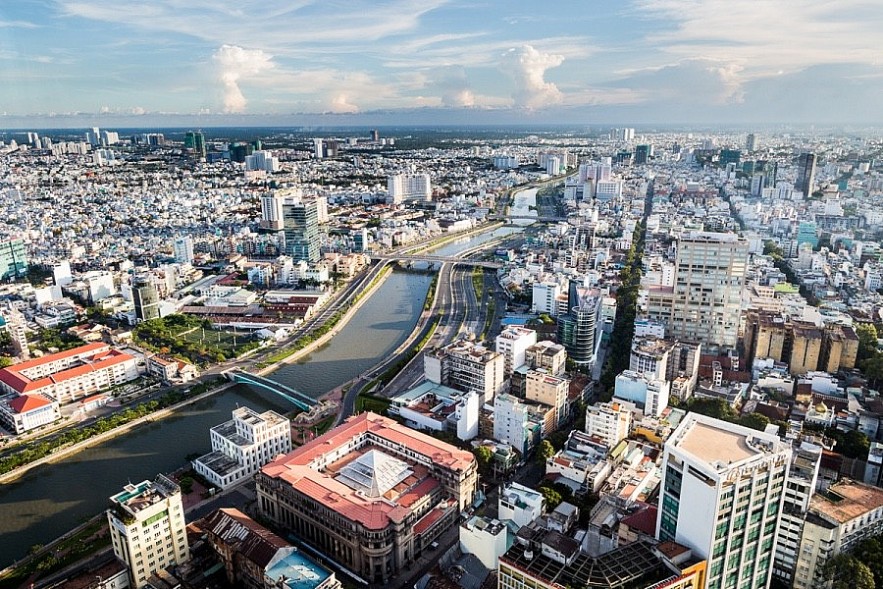 |
| Ho Chi Minh City. Photo: Vietnam Tourism |
Second, the leadership of the Communist Party of Vietnam in ensuring economic security is a crucial condition for liberating and further advancing the social productive forces in the new era.
The liberation and development of social productive forces and the enhancement of national comprehensive strength are fundamental objectives in building socialism in Vietnam. Socio-economic development strengthens the nation’s economic, scientific, technological, defense, and security capacities while establishing a solid material foundation for the goals of "a prosperous people, a strong nation, democracy, justice, and civilization." In this context, economic development and economic security serve as central missions, and the key to realizing Vietnam's aspirations for national development in the modern era.
As the ruling party, the Communist Party of Vietnam bears the responsibility of guiding the people in liberating and developing social productive forces while continuously improving the quality of life for the populace. The Party leads the State in building and refining a comprehensive socialist-oriented market economy framework, enhancing productivity, quality, efficiency, and competitiveness, elevating the nation's economic potential to new heights.
To fulfill its leadership role in ensuring economic security, the Party consistently synthesizes practical insights and develops economic theories to meet the demands of national construction and development in each period. It emphasizes managing and addressing key relationships, such as the balance between developing productive forces and gradually building socialist production relations, as well as between stability, innovation, and growth.
Furthermore, maintaining the Party’s comprehensive, focused, and unified leadership in economic security actively contributes to combating corruption, waste, negativity, parochialism, and evasion of responsibility among officials and Party members. Simultaneously, it fosters and protects entrepreneurship and innovation, harnesses collective intelligence, and mobilizes effective participation from all sectors of society in economic development. This inspires individuals and social forces to contribute wholeheartedly to the renewal and advancement of the nation, thereby strengthening Vietnam’s overall national capacity.
Third, the Party's leadership in ensuring economic security fosters the integration of anti-corruption, anti-waste, and anti-negativity efforts with the mission of socio-economic development in the new context.
On one hand, the Party's leadership in economic security consolidates collective strength and inspires strong motivation for economic development, ensuring a socialist orientation and enhancing the nation’s ability to address risks and challenges in an increasingly globalized and interconnected world. This creates comprehensive strength to achieve national development goals and specific targets for economic security. On the other hand, it helps overcome limitations in understanding and thinking about pure economic development that neglects security concerns, while gradually mobilizing the political system's strength in ensuring economic security.
As a result, macroeconomic stability has been maintained, and the scale and potential of Vietnam's economy have steadily increased, even amidst challenges like the COVID-19 pandemic. Domestic production autonomy has been enhanced, the independence and self-reliance of Vietnam's socialist-oriented market economy have been upheld. Foreign investment attraction continues to rise annually, reaching consistently high levels in recent years, while social welfare and public benefits are ensured.
Additionally, the Party's centralized and unified leadership in economic security has proven effective in curbing corruption, waste, and negativity. Both theory and practice demonstrate that this leadership model is a powerful tool for controlling corruption and fostering transparency. In recent years, the Party has intensified its anti-corruption campaign. This effort has yielded significant results.
For state agencies, the Party's strengthened leadership has bolstered discipline, integrity, and accountability in public service, while economic management standards continue to improve. In state-owned enterprises, leadership efforts have addressed weaknesses, legal violations, and corruption, ensuring better governance and operational efficiency.
In conclusion, the Party's centralized and unified leadership in economic security effectively integrates anti-corruption efforts with socio-economic development objectives, enabling Vietnam to navigate emerging challenges and sustain comprehensive national progress.
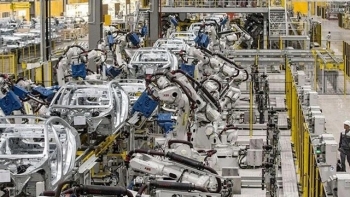 | Building Strong and Resilient Nation for Secure Future The 13th National Congress of the Party stated that "The Fourth Industrial Revolution, especially with the rapid development of digital technology, has created breakthroughs in ... |
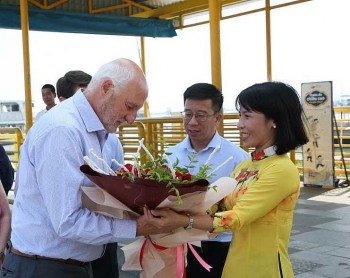 | Argentine Justicialist Party Delegation Visit Ha Long Bay Head of the delegation, Emilio Jose Ribera, expressed his satisfaction at the visit, where the delegates got first-hand experience and contributed to further introducing the ... |
Recommended
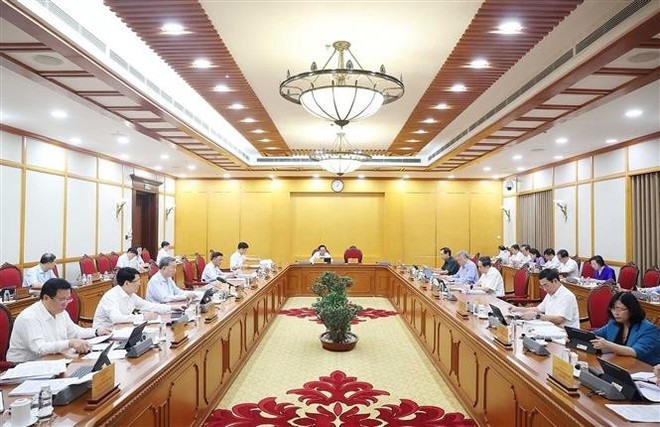 National
National
Vietnam News Today (Jun. 7): Prime Minister works with Estonian firms to accelerate projects in Vietnam
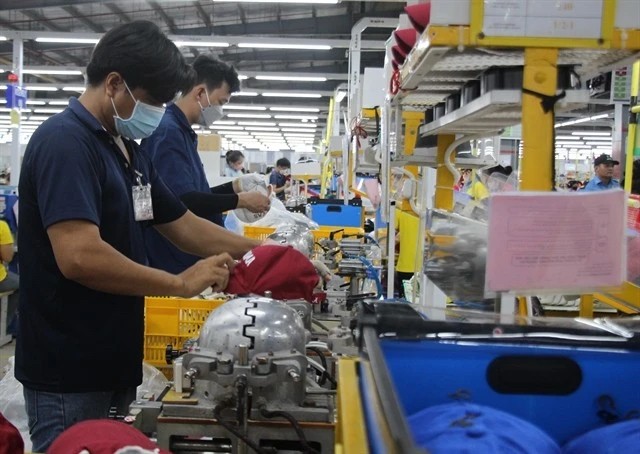 National
National
Vietnam News Today (Jun. 6): Foreign Investment in Vietnam Surges in Five Months
 National
National
Vietnam News Today (Jun. 5): PM sets off for attendance at UNOC 3 in France, official visits to Estonia, Sweden
 National
National
Vietnam News Today (Jun. 4): Vietnam - Promising Candidate for Southeast Asia’s Next Powerhouse
Popular article
 National
National
Shangri-La Dialogue 22: Vietnam Highlights Some Issues of Ensuring Stability in a Competitive World
 National
National
Vietnam News Today (Jun. 3): PM Pham Minh Chinh to Attend UN Ocean Conference, Visit Estonia, Sweden
 National
National
Vietnam News Today (Jun. 2): Vietnamese Trade Mission Sounds Out Business Opportunities in United States
 National
National




